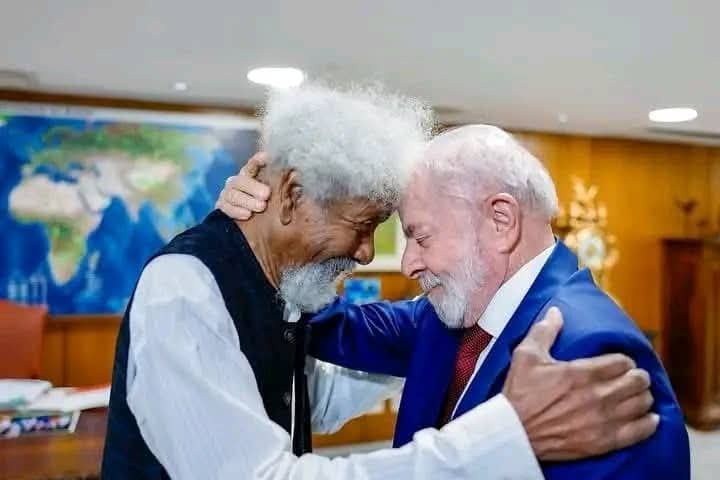Brasília was glowing that evening, bathed in the soft hues of sunset that bounced off the city’s famed modernist skyline. Inside the grand banquet hall of the Palácio da Alvorada, crystal chandeliers threw sparks of light across polished marble floors. It was a state lunch in honor of Nigeria’s President Bola Ahmed Tinubu, but soon the spotlight would shift, not to a politician, but to a poet.
At one end of the table, seated among dignitaries and cabinet members, was Professor Wole Soyinka. At 91, Nigeria’s first Nobel Laureate in Literature sat with quiet dignity, his shock of white hair resembling a crown no mortal had given him but which life itself had bestowed. He carried with him not just the weight of age, but the history of a continent, the stories of resistance, and the gravitas of wisdom.
The room buzzed with the rituals of diplomacy—clinking glasses, polite laughter, rehearsed toasts. But then, a disruption, quiet yet seismic. President Tinubu rose from his chair, the most powerful seat in the room, and did the unthinkable: he offered it to Soyinka.
“Egbon, e wa joko si ibiyi,” Tinubu said in Yoruba, his voice carrying across the hall. Elder brother, please come and sit here.
The hall fell into stillness. Even the orchestra playing in the background seemed to soften, as though the violins knew something greater than protocol was unfolding. For a heartbeat, no one moved. Then, a murmur of awe rippled through the audience. It was a gesture that transcended politics: a president bowing before wisdom.
President Lula da Silva of Brazil leaned forward in fascination. A man of humble beginnings himself, Lula understood symbolism. He had risen from the factories of São Paulo to the presidency, carrying the hopes of workers on his shoulders. But this—this was a different kind of power. A president yielding his seat to an elder. A cultural gesture that spoke louder than speeches.
Later, in a private moment, Lula confessed his astonishment to Soyinka. “I could not stop thinking about the respect your President showed you,” he said, almost reverently. “What an honor. What dignity.”
But there was more. Learning that Soyinka had endured a grueling 36-hour journey from Lagos to Brasília at his age, Lula was visibly moved. “At over 90, you came all this way for Africa. What greatness.” His words carried the sincerity of a man who recognized resilience when he saw it.
Lula, who often mused about his own longevity, could not help but reveal a personal wish. “I want to live to 120,” he said, half in jest, half in yearning. The room chuckled, but there was no mistaking the undertone—here was a leader looking at another and wondering what secret fuel burned within him.
Then came the moment that would etch itself into history. Lula, lowering his voice, edged closer to the literary sage. “The grace on you,” he whispered, “I ask it upon myself.”
It was almost as if he had slipped into Nigerian street parlance: “Prof, abeg cut soap for me.” A playful plea, a humble request for a share of Soyinka’s longevity, his aura, his unshakable grace.
Soyinka did not laugh, nor did he speak. Instead, with the quiet gravitas of an elder whose wisdom is beyond words, he leaned forward. His white crown brushed against Lula’s forehead. For a moment, two worlds touched: Africa and South America, poetry and politics, tradition and modernity.
The hall, once loud with chatter, seemed to hold its breath. It was not a handshake. Not a hug. It was an embrace of spirits, a communion across continents, an exchange of heritage and blessing.
Those who witnessed it knew they were watching more than protocol. They were seeing diplomacy of the heart, the kind of encounter that cannot be drafted in communiqués or captured in trade agreements. It was the kind of moment history remembers when the speeches have been forgotten.
And when it was over, the room seemed changed. Leaders straightened their backs. The air carried a hush of reverence. For in that single gesture, the eternal truth had been made visible: power governs, but wisdom reigns.





